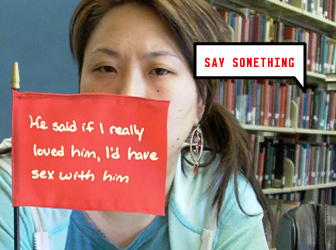
Dating violence is a major issue facing college students ages 18 to 25, according to Jacob Oppenheimer, coordinator of the Men's Anti-Violence Council in the University of Iowa Women's Resource and Action Center (WRAC).
"In national surveys, one third of students have experienced physical violence in their relationships," says Oppenheimer, who is also a second year graduate student in the UI College of Education's Master of Arts in Higher Education and Student Affairs Program. "Almost 50 percent of students reported some form of emotional, sexual, verbal, or coercive behavior at least once."
This is why the Men's Anti-Violence Council and WRAC are partnering to spearhead The Red Flag campaign on the UI campus with support from the UI Vice President for Student Life.
This is a national public awareness campaign designed to address dating violence to inform college students about the "red flags" or warning signs of unhealthy relationships and dating violence.
"The red flags of dating violence and the warning signs of danger and disrespect, are everywhere," Oppenheimer says. "The campaign was created using a bystander intervention strategy, encouraging friends and other campus community members to say something when they see warning signs for dating violence in a friend’s relationship."
Starting Thursday, Nov. 1, red flags were strategically placed on different parts of campus including the UI Pentacrest, where the flags will remain until Monday, Nov. 5. The flags will then be rotated to different parts of the campus throughout the month.
"The flags you will see throughout campus are symbolic of the red flags of dating violence present in people's own lives," says Linda Kroon, WRAC director. "When you see these red flags, we urge you to go to our campaign website to find local resources where you or your friends can seek help."
Kroon advises that if you or someone you know is in immediate danger, call 911. For those who need help or resources after an abusive relationship, need specific accommodations on campus to create a safe space, or would like a referral for community contacts, they should check the website above.
People can also continue the conversation regarding dating violence online through the Facebook page or on Twitter #RedFlagIowa.

"No one should fear an intimate relationship," Oppenheimer says. " Every student, staff, faculty, or community member has the right to a violence-free relationship based on trust, love, respect, and open communication."
The Women’s Resource and Action Center and the Men’s Anti-Violence Council will host a dating violence awareness panel discussion Thursday, Nov. 8, at 5:15 p.m. in the Illinois Room of the Iowa Memorial Union. The event is co-sponsored by UI Fraternity and Sorority Life, the UI Center for Diversity and Enrichment in the Chief Diversity Office, the Domestic Violence Intervention Program, and Monsoon United Asian Women of Iowa.
The panelists will share specific examples of dating violence while also discussing resources available for students and how anyone can support victims of dating violence.
Student volunteers will also screen the Red Flag Iowa movie by students, for students talking about the personal and professional dangers of dating violence Thursday, Nov. 15 at 5:15 p.m. in the Indiana Room of the Iowa Memorial Union. The movie, created by Oppenheimer, will feature a number of different students answering the question, "What would you like to tell the University of Iowa Community about Dating Violence?” These students have come together to speak out against dating violence and together seek to promote healthy relationships, Oppenheimer says.
For learn more, visit www.youtube.com/user/MensAntiViolence.
Both events are free and open to the public. For more information or special accommodations to attend, contact the Women’s Resource and Action Center in advance at 319-335-1486.
The two events are part of a broader effort by the UI to raise awareness about dating violence through the adoption of the nationally recognized Red Flag Campaign.
Dating violence includes physical, emotional, and verbal harassment, Oppenheimer says. The campaign uses the imagery of a red flag as a symbol for the warnings of dating violence in implicit and explicit ways.
The month also educates people about the widespread nature of dating violence and ways that students can speak out against disrespectful and unhealthy relationships.
"Anyone can perpetrate acts of dating violence and its sustained use depends on a common misperception that the behavior is either appropriate or unnoticed," Oppenheimer says. "If you see a red flag in someone's relationship, and you are not sure what is happening, ask about it. Ask your friends, ask your resident assistant, ask the people involved."
Oppenheimer says that if someone can successfully highlight that others are witnessing unhealthy abusive behavior, a perpetrator is significantly likely to reduce their overt aggression.
"You can also talk to the victim of dating violence afterwards to let them know that they are not alone," Oppenheimer says. "It is common to fear misunderstanding or escalation in acts of dating violence, but there is little worse than the feelings of abandonment or acceptance that often comes with dating violence."
Additional local Red Flag Campaign campus and community partners include UI Housing and Dining; Fraternity and Sorority Life; Health Iowa; the UI Threat Assessment Team; Domestic Violence Intervention Program (DVIP); and the Monsoon United Asian Women of Iowa.